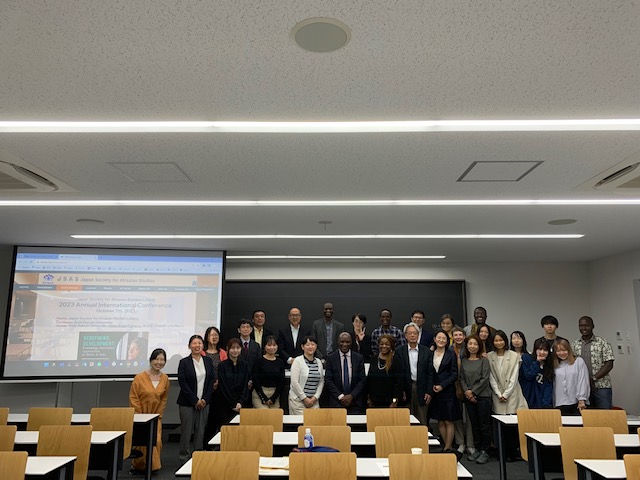CELEBRATING JSAS 2023 @ NAGOYA
- JSAS
- Oct 21, 2023
- 4 min read
(V.L. Ssali)

The 2023 annual conference at the Meijo koen Campus of Aich Gakuin University concluded with a bang: renowned author and inspirational speaker, Dr. Sindiwe Magona, joined us via Zoom and gave us a very humorous and educative plenary speech. Dr. Magona, who was the main plenary speaker, had been scheduled to speak at the end of the day’s presentations (16:20 – 17:20 JST) in consideration of the 7 hour-difference between Nagoya and Cape Town where she resides. The closing speech by Dr. Magona, a renowned author and advocate for the spirit of Ubuntu, was a fitting act for a conference that had “redefining development” as its theme. True Afrasia development, she argued, is premised on “oneness of life-human and non-human, animate and inanimate.” She argued that there would be no true development on the two sister continents without KINDness and kindNOWING of the other, the essence of Ubuntu. These are the stories we need to tell ourselves and future generations: stories of kindness, and not the stories that are all too common now: “stories that bear our sad failure to live in accordance with the dictates or expectations of Mother Nature – to live in full knowledge of Ubuntu- our oneness.”
There were three other plenary speakers before Dr. Magona. Dr. Yoshida Sayuri from the Graduate School of Humanities at Nagoya University based her keynote speech on her cultural anthropological research in the Kafa zone in Ethiopia. She argued that the practices for passing on history and culture to future generations will be crucial for redefining development in Ethiopia and on the continent at large. She talked extensively about her work in the Kafa society of southwest Ethiopia, arguing that the future development of small (tribal) communities will be premised on their ability to pass on their culture and history to future generations.
The second keynote speaker at the morning plenary was Dr. Yamada Shoko from the Graduate School of International Development, also at Nagoya University. She talked about what the Skills and Knowledge for Youths (SKY) project of Nagoya University has been doing in Ethiopia, Ghana, and South Africa, to contribute to the effective formation of skilled workforces. Her key note speech, spiced with lots of practical demonstrations, hit the right note arguing that the two demographically young continents must look to their youth if they are to effectively re-define, pursue, and achieve true development.
The third plenary speaker was our own Dr, Hanai Kazuyo, the new JSAS president. She is also the mastermind and coordinator of the JSAS Hitachi Research Project. She reported on the progress of the research project entitled “Exploration of Practical Wisdom and Resilience Overcoming Downside Risk - Collecting grassroots voices in Africa under COVID-19.” The project, supported by the Hitachi Fund Support for Research Related to Infectious Diseases since December 2021, is conducted by a research team led by JSAS board members, and which has carried out international collaborative fieldwork in six African countries. She also invited brief reports by representatives for South Africa and Uganda.
The plenary session was preceded by a word of welcome and support from Professor Hiromichi Hikita, the President of Aichi Gakuin University. We thank him, and Aichi Gakuin University, for co-hosting this memorable event. He did also remind us about the importance of "Rising Africa," and encouraged us to keep pursuing the intercultural, intercontinental, and intergenerational links.
The parallel sessions in the afternoon also had many interesting and informative papers read under two broad themes: (1) symbiotic Afrasian partnerships: lessons & future ambitions, and (2) redefining Afrasian political &socio-economic development. They ranged from mutual Afrasian connections, old and new, to the hot topic of the emerging Asian giant, China, and her adventures in Africa.
JSAS 2023 was particularly memorable for me as founding and outgoing president. In the General Meeting after Dr. Magona’s presentation I could finally on behalf of the outgoing JSAS Board of Directors hand over to Dr. Hanai and the new board after five years at the helm. It was time to thank all the outgoing board members for their support and good counsel throughout the founding term which included almost three years of the Covid-19 pandemic. It was hard for us as a young association to stay active and relevant, but we managed to do exactly that because of everyone’s commitment. I welcome the new executive and the new board members. I pledge my continued support and commitment to the objectives and goals of JSAS.
Finally, I would like to thank everyone who contributed to the success of this conference. Professors Otchia Christian and Rozsnyoi Hedwig, and Miss Hina Takemura of the JSAS 2023 Conference organizing committee. Thank you to all the student volunteers from Aichi Gakuin University. Special thanks to Professor Mine for his support, not only during the five years of JSAS’ maiden leadership, but he and Ms. Junko Satake contributed enormously to the drafting of the original theme and concept of this conference, and in contacting and coordinating with our chief guest Dr, Magona. Thank you also for being part of the study sessions into the works of the latter. Finally, thank you to all who contributed articles to the series “understanding development,” which, together with the online reading sessions of Dr. Magona’s works gave us a profoundly engaging preparation to the JSAS 2023 conference.
Long live JSAS, long live Afrasian connections.
SSALI Vick Lukwago
Aichi Gakuin University
Outgoing President, and Chair, Nagoya 2023 Organizing Committee.





Comments